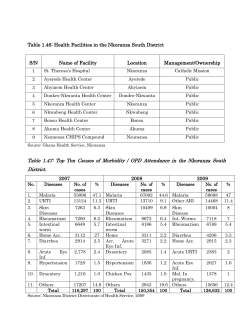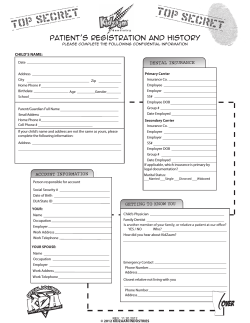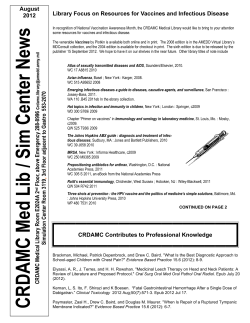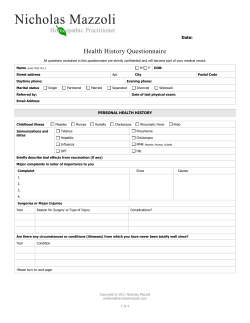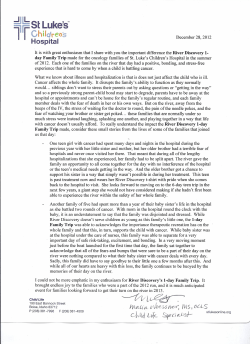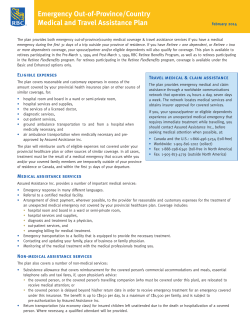
Session 3: Infec ous Disease C: Traveling the World:
January 20-22, 2012 Des Moines Marrio , 700 Grand Avenue, Des Moines, IA Session 3: Infec ous Disease C: Traveling the World: Keeping Pa ents Safe and Healthy 3:00pm - 4:00pm ACPE UAN 107-000-12-021-L01-P Ac vity Type: Applica on-Based 0.1 CEU/1.0 Hr Program Objec ves for Pharmacists: Upon compleƟon of this CPE acƟvity parƟcipants should be able to: 1. List the travel immuniza ons required or recommended by the CDC by specific region of travel 2. Discuss recommenda ons and concerns associated with Hepa s A, Hepa s B and typhoid 3. Discuss precau ons when dealing with an area of travel that has a malaria risk 4. List risk versus benefit of yellow fever 5. Discuss the risk of vaccine overuse and what it means for popula on health Speaker: Adam Jackson, PharmD, BCPS, received his Doctor of Pharmacy from the University of Florida College of Pharmacy in 1998. He then went on and completed his residency in Infec ous Diseases Pharmacy Prac ce at Bay Pines VA in St. Petersburg, Florida. Since 1999 he has served primarily as the Clinical Pharmacy Specialist in Infec ous Diseases for Kaiser Permanente Colorado. His roles have included serving the Infec ous Disease team in assessing HIV drug regimens, designing and implemen ng various an bio c use ini a ves, educa ng the region on appropriate an bio c and vaccine use and implemen ng new vaccines into the region as well. During his me at Kaiser Permanente he has also helped develop, analyze and implement various pharmacy benefit and formulary policies as a Pharmacy Benefits Analyst. He served as the supervisor for the Clinical Pharmacy Interna onal Travel Clinic and con nues to be a clinical consultant to that group. Speaker Disclosure: Adam Jackson does not report any actual or poten al conflicts of interest in rela on to this CPE ac vity. Off-label use of medica ons will not be discussed during this presenta on. 1/10/2012 Faculty Disclosure Traveling the World: Keeping Patients Safe and Healthy Adam B. Jackson, PharmD, BCPS Clinical Pharmacy Specialist in Infectious Diseases Kaiser Permanente Colorado Adam Jackson reports he has no actual or potential conflicts of interest associated with this presentation. Adam Jackson has indicated that off-label use of medication will be discussed during this presentation. Learning Objectives Pre-Assessment Questions Upon completion of this activity pharmacists (or pharmacy technicians) What questions would you ask, and what travel will be able to: recommendations would you consider, for the following itineraries? Assess travel-related health risks. 55 year old male with CAD going to Puerto Vallarta Assess general types of itineraries for health risks. Assemble general travel medicine recommendations. a. adult imms / mode of travel b. hepatitis A / duration of stay diarrhea / adult imms yellow fever / typhoid fever c. d. Evaluate pharmacy roles in travel medicine. Pre-Assessment Questions Pre-Assessment Questions What questions would you ask, and what travel What questions would you ask, and what travel recommendations would you consider, for the following itineraries? recommendations would you consider, for the following itineraries? 45 year old male going to Europe 34 year old female going to “the Holy Land” a. zoster / locations a. where / adult imms b. typhoid fever / hepatitis A adult imms / locations polio / hepatitis A b. polio / malaria hepatitis A / typhoid fever yellow fever / typhoid fever c. d. c. d. 1 1/10/2012 Pre-Assessment Questions Pharmacist’s Role What questions would you ask, and what travel Formulary recommendations would you consider, for the following itineraries? 38 year old nurse travelling to Mozambique a. purpose / “order up” b. adult imms / malaria polio / malaria tetanus / varicella c. d. Storage Administration Dosing, scheduling Patient and provider education Documentation Screening Pre and postexposure prophylaxis Resources Recommending Vaccines CDC Yellow Book Emerging Infectious Diseases Age CDC Pink Book Clinical Infectious Diseases CDC MMWR Journal of Infectious Diseases Allergy status AHFS Thompson’s Travel and Routine Package insert Immunizations Pediatric Redbook IAMAT Past vaccination history Comorbidities Disease risk factors Past disease exposures Travax (Shoreland) Recommending Travel Vaccines Where exactly are you going? What exactly will you be doing? Categorization of Vaccines Routine infant vaccines pertussis, tetanus, Hib, hepatitis B, conj pneumococcal, rotavirus, poliovirus, MMR, varicella, hepatitis A, influenza Routine adult vaccines Exactly how long will you be staying? What medications are you currently taking? pneumococcal, influenza, tetanus-pertussis, hepatitis B, zoster Routine adolescent vaccines Tetanus / pertussis, conj meningococcal, HPV 2 1/10/2012 Categorization of Vaccines Travel vaccines (commonly used) Tetanus / pertussis, hepatitis A, typhoid fever, polio Travel vaccines (less commonly used) yellow fever, hepatitis B, meningococcal Travel vaccines (rarely used) Japanese encephalitis, rabies 3 1/10/2012 Lowest Risk Destinations Hepatitis A Contaminated food and water Resorts in Mexico Australia Cruises Japan Europe Israel Japan Russia China tours Kansas Children - asx; adults - sx; no chronic state, rarely fulminant Past HAV = lifelong immunity 4 1/10/2012 Hepatitis A Typhoid Fever Childhood series Salmonella typhi – contaminated food / water MSM Travelers in areas of poor sanitary conditions All but the lowest risk destinations Risk increases w/ duration, rural, non-tourist Typhoid Fever Typhoid Fever Central America Africa Costa Rica Kenya Nicaragua Tanzania South America Brazil Mali Southeast Asia Argentina Malaysia Venezuela Burma Peru Thailand India Oral vaccine (Vivotif Berna) live vaccine – 70-80% effective 4 doses - 1 cap qod, 1 h before meals, w/ lukewarm - cool water, refrigerate series should be completed 1 week prior to trip 5 year duration ADRs - GI separate series 24 h from abx do not give to immunocompromised or <6 yo Typhoid Fever Yellow Fever Injectable vaccine (Typhim Vi) inactivated vaccine – 70-80% effective Mosquito borne disease 1 dose 200k cases globally annually dose should be given 2 weeks prior to trip mortality rate - 60% 2 year duration ADRs - mild local sx, possible flu-like s/s only for use in pts >2 yo may be required for entry only administered at licensed centers 5 1/10/2012 Yellow Fever Live vaccine - >90% effective Travelers to equatorial S. America, Africa 1 dose 10 year duration Yellow Fever Yellow Fever South America Africa Brazil Kenya Argentina Tanzania Venezuela Mali Peru Warnings NEVER give to pts < 6mo - encephalitis Risk of encephalitis increases at < 9mo anaphylaxis to eggs immunocompromised Concerns in elderly, especially if first time ADRs - mild local “bee sting” Meningococcal Conjugate vaccine preferred FDA indication 9 mo - 55 years of age Targeted populations: adolescents 11-18 years old travelers to “meningitis belt” of Africa often recommended for the Hajj pilgrimage asplenic patients 6 1/10/2012 Rabies Meningitis Belt Mali Neurologic disease - animal bites Nigeria any animal bite in developing nation Ethiopia avoid close contact with animals Cote d’Ivoire Targeted population: probable exposure to animals working w/ animals, spelunkers, caves, bats prolonged travel in risk area Japanese Encephalitis Rabies Central America Africa Costa Rica Kenya Nicaragua Tanzania Mali South America Brazil Southeast Asia Argentina Malaysia Venezuela Burma Peru Thailand Leading cause of encephalitis in Asia 20-30% die 30-50% neurologic complications transmitted through mosquitoes overall risk is very low (1/mill, 1/20k/wk) rice paddies, marshes, pig farming India Japanese Encephalitis Targeted population intensive short term exposure, moderate long term exposure (Asia, Indian subcontinent) Two vaccines JE-VC > 17 years; 2-dose series JE-MB 1 – 16 years; 3-dose series, widely unavailable Traveler’s Diarrhea Prevention is the best medicine peel it, boil it, cook it or forget it meats are OK if cooked thoroughly breads are OK if baked thoroughly Proph abx should not be used routinely Bismuth sub-salicylate (BSS) 7 1/10/2012 Traveler’s Diarrhea Supportive treatment Malaria Antibiotic treatment rehydration Fluoroquinolones loperamide Azithromycin #1 parasitic disease worldwide Rifaximin Mosquito borne parasitic disease Metronidazole Severity of disease depends on species Nitazoxanide SMX/TMP no longer Plasmodium falciparum P. vivax P. malariae P. ovale Malaria Malaria Risk increases with: Chemoprophylaxis rural travel does pt need medication? nighttime travel what is drug resistance in the area? lower altitudes areas of Central and South America Prevention is vital areas of Middle East DEET spray Permethrin 0.5% on clothes, nets, walls Tight closing doors, central AC all of India areas of SE Asia bed nets sprayed w/ permethrin Malaria Malaria Central America most of Africa Africa Chloroquine Nicaragua Kenya Honduras Tanzania used only in C. America due to resistance Mali 500 mg po qweek starting 1 week before trip South America Brazil Southeast Asia Venezuela Malaysia Peru Burma India stop 4 weeks after leaving area GI ADRs possible, CNS, cardiac unlikely Thailand 8 1/10/2012 Malaria Mefloquine: Malaria Doxycycline: used in areas of chloroquine resistance borders Thailand, Cambodia, Myanmar/ Burma 250 mg po qweek starting 2 weeks before trip 100 mg po qd starting 1 day before trip stop 4 weeks after leaving area stop 4 weeks after leaving area CNS rxns - HA, insomnia, vivid dreams ADRs - vaginal yeast infxns, GI rarely seizures, psychosis do not use in children < 8 yo, pregnancy possible cardiac effects - cardiac rhythm drugs Malaria Atovaquone / Proguanil (Malarone) active against mefloquine resistance well tolerated more expensive for most trips no more effective than other agents once daily, 1 day prior through 7 days after Miscellaneous Travel Concerns Motion sickness dimenhydrinate, meclizine, promethazine Transderm-Scop patches Altitude sickness keep hydrated gradual ascent acetazolamide dexamethasone Special Populations Pregnant women inactivated vaccines are generally safe avoid live vaccines (YF, MMR, varicella, OPV) mefloquine concerns no evidence with atovaquone / proguanil Immunocompromised assess level of immune deficiency TNF-inhibitors usually contraindicated Steroids dependent on dose, duration, route Special Populations Health care workers Hep B, varicella, MMR, influenza Older adults pneumococcal, influenza, tetanus Adults w/ chronic illnesses pneumococcal, influenza Travelers use as opportunity to bring pts up to date avoid live vaccines if possible 9 1/10/2012 Scavenger Hunt KF is 35 yo w/ RA. 10/10/11 refill of methotrexate Kaiser Permanente Colorado (KPCO) Traveling to Thailand on business in one week Service membership population of 532,087 Staying for two weeks 21 outpatient clinics States “in good health” Integrated care Haven’t seen rheumatologist in 10 months Patients access vast majority of care at KP Electronic medical record History of KPCO CPITC KPCO CPITC Today MD consults or referrals outside of KPCO Three part-time (0.8 FTE) pharmacists Recommendations not consistent Centralized telephone-based service Founded in 1992 Supported by float pharmacists PRN One pharmacist a few hours a week Supported by pharmacy technicians Telephone service Serves KPCO and KP Ohio 1994 two full-time pharmacists Overview of the Service Provide comprehensive, consistent and cost-effective travel medicine advice Gather trip information Verify current medications and allergies Assess drug interactions / contraindications Discuss vaccines and medications Review insect, and food / water precautions Counsel on estimated costs Technician Process Intake w/ questionnaire Departure date Length of trip Country/countries Purpose of trip Callback phone number Book telephone appointments Same day appointment Regular appointment 20 minute vs. 40 minute 10 1/10/2012 Pharmacist Process Pharmacist Roles 18 consults per day / provider Healthcare provider questions Consultation Follow-up patient calls and emails Documentation/ordering Travel alerts/new information Route to ID MD for approval Keep documents up to date Route to clinic for nurse visit appointment Mail or email follow up information Clinic Set Up Documentation Electronic medical Record Clinic Set Up Resources ShorelandTravax Pre-built progress notes Ordering template Standardized letter Centers for Disease Control and Prevention (www.cdc.gov) World Health Organization (www.who.int) Outcome Measures Reported weekly Number of consults per day per provider Supply/demand Access Metrics Same day appointments Backlog Scheduled vs. Non-Scheduled Consults Reduce number of patient call-backs Prioritizes work during busier months Improved member preparedness No Shows Improved member service 11 1/10/2012 Post-Assessment Case 1 Questions 1-2 Post Assessment Question #1 A.F. is a 12-year-old female who is traveling to Tanzania. She Which one of the following is the best medication for A.F. to is traveling with her family on a church mission that leaves in April and will stay there for 6 weeks. A.F. and her family will be living in local villages. Her past medical history is significant for bipolar disorder. A.F. received all of her childhood vaccines. At this time A.F. has not had a routine adolescent visit with her primary care physician and has not received any of her routine adolescent vaccinations. Post Assessment Question #2 receive to help prevent malaria? a. b. c. d. mefloquine atovaquone / proguanil chloroquine tetracycline Post-Assessment Case 2 Questions 3-4 Which one of the following is the most important additional step for A.F. to take to avoid malaria? a. b. c. d. Use DEET Drink bottled water Put permethrin netting around bed Stay in urban hotels J.F. is a 68-year-old male who is taking a cruise in three weeks, on January 7, to the Caribbean. His past medical history is significant for coronary artery disease with an acute myocardial infarction (AMI) 4 years ago. He currently takes simvastatin, lisinopril, and atenolol. Post Assessment Question #3 Post Assessment Question #4 Which one of the following is J.F.’s greatest health risk while J.F.’s physician asks you what vaccines J.F. should receive. on his Caribbean cruise? a. b. c. d. Coronary artery disease Cholera Typhoid fever Hepatitis A Which one of the following is the best response to J.F.’s physician? a. b. c. d. Hepatitis A / Typhoid Fever Influenza / Pneumococcal Tetanus / Influenza Hepatitis A / Pneumococcal 12 1/10/2012 Post Assessment Question #5 Continuing Pharmacy Education Which one of the following trips would place a patient at Go to www.GoToCEI.org click on My Portfolio highest risk for Yellow fever? Scroll down to Take Exam – Enter Access Code: (case sensitive) a. b. c. d. 4 week trip to Mali 10 day trip to Costa Rica 2 week trip to Vietnam 2 week trip to Egypt Pharmacists - _________ Technicians - __________ 13 2012 Educational Expo Traveling the World: Keeping Patients Safe and Healthy Adam Jackson, PharmD, BCPS Post‐Assessment Questions For questions 1 – 2, please refer to the following case: A.F. is a 12‐year‐old female who is traveling to Tanzania. She is traveling with her family on a church mission that leaves in April and will stay there for 6 weeks. A.F. and her family will be living in local villages. Her past medical history is significant for bipolar disorder. A.F. received all of her childhood vaccines. At this time A.F. has not had a routine adolescent visit with her primary care physician and has not received any of her routine adolescent vaccinations. 1. Which one of the following is the best medication for A.F. to receive to help prevent malaria? A. mefloquine B. atovaquone / proguanil C. chloroquine D. tetracycline 2. Which one of the following is the most important additional step for A.F. to take to avoid malaria? A. Use DEET B. Drink bottled water C. Put permethrin netting around bed D. Stay in urban hotels For questions 3 – 4, please refer to the following case: J.F. is a 68‐year‐old male who is taking a cruise in three weeks, on January 7, to the Caribbean. His past medical history is significant for coronary artery disease with an acute myocardial infarction (AMI) 4 years ago. He currently takes simvastatin, lisinopril, and atenolol. 3. Which one of the following is J.F.’s greatest health risk while on his Caribbean cruise? A. Coronary artery disease B. Cholera C. Typhoid fever D. Hepatitis A 4. J.F.’s physician asks you what vaccines J.F. should receive. Which one of the following is the best response to J.F.’s physician? A. Hepatitis A / Typhoid Fever B. Influenza / Pneumococcal C. Tetanus / Influenza D. Hepatitis A / Pneumococcal 5. Which one of the following trips would place a patient at highest risk for Yellow fever? A. 4 week trip to Mali B. 10 day trip to Costa Rica C. 2 week trip to Vietnam D. 2 week trip to Egypt Infectious Disease: Traveling the World: Keeping Patients Safe and Healthy “Healthy” Business Traveler KF is a 35-year-old with rheumatoid arthritis who presents to the pharmacy on October 10 for a refill of her methotrexate. While she is paying for her prescription she states that she is excited because she leaves in only one week for a trip to Thailand. You ask her what sort of medical preparations she has taken for her trip and she states none because she’s only staying there for two weeks on business and she’ll be staying in hotels the whole time. You express some concern over this but she states that she is in great health, the methotrexate keeps her arthritis symptoms well under control. She feels so good in fact that she has not seen her rheumatologist in about 10 months. What went wrong? (Assessment) Patient problems: System problems: Intervention: (Plan)
© Copyright 2025




